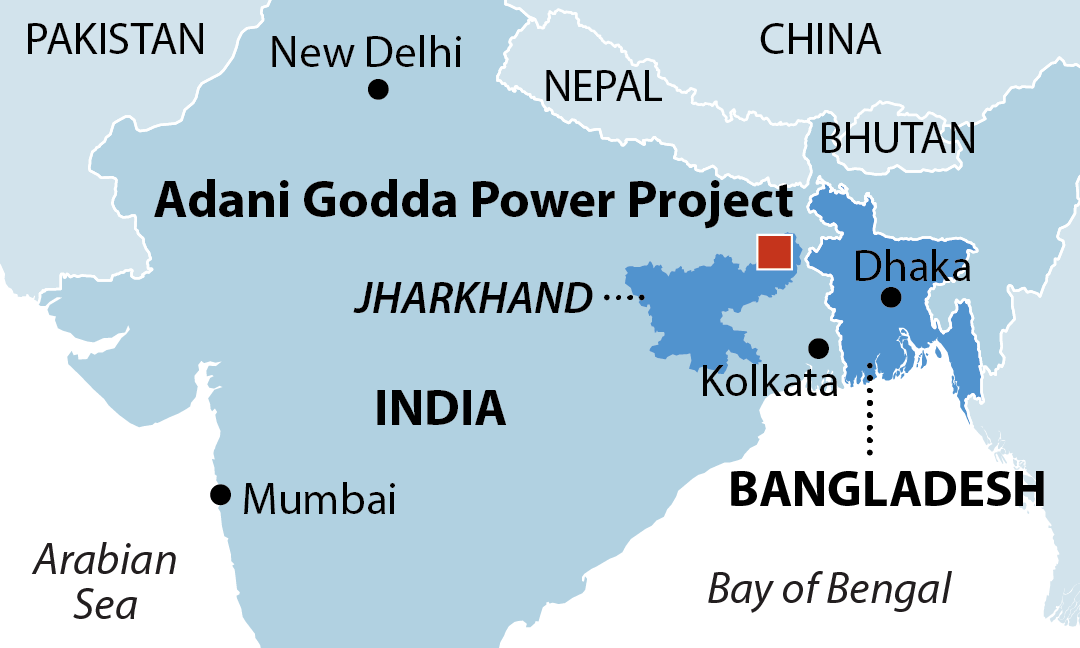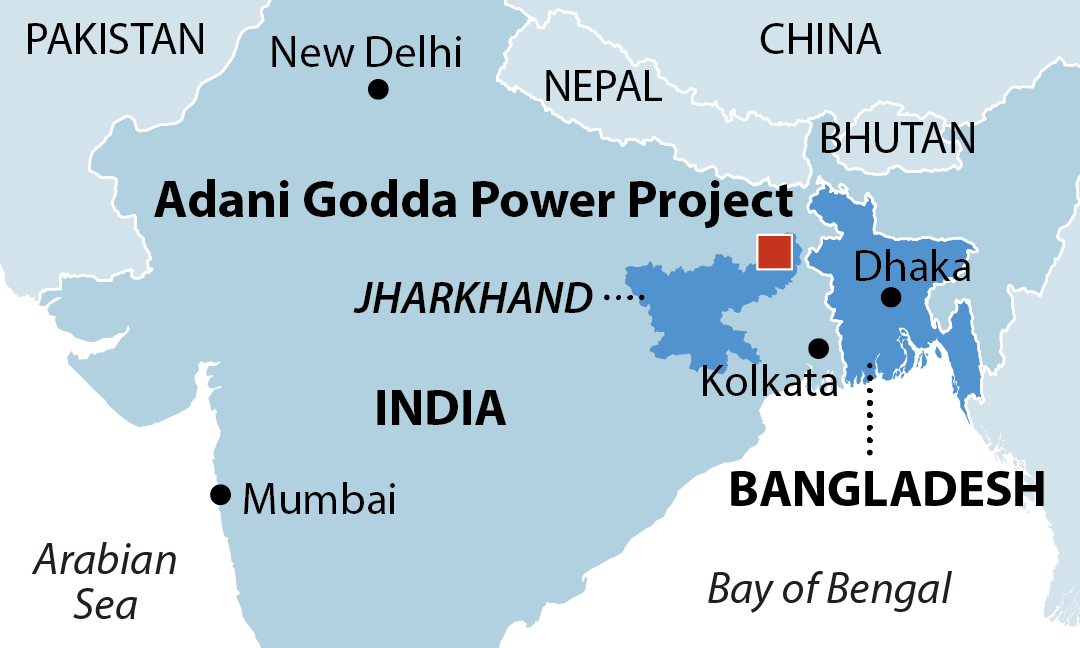IEEFA Report: Proposed Coal-Fired Project for Bangladesh Is a High-Priced Scheme Meant to Prop Up Adani Power

 April 10, 2018 (IEEFA.org): Adani’s proposed Godda Power project would prove financially unviable and a poor strategic fit for Bangladesh, concludes a report published today by the Institute for Energy Economics and Financial Analysis (IEEFA).
April 10, 2018 (IEEFA.org): Adani’s proposed Godda Power project would prove financially unviable and a poor strategic fit for Bangladesh, concludes a report published today by the Institute for Energy Economics and Financial Analysis (IEEFA).
The IEEFA study—“Adani Godda Power Project: Too Expensive, Too Late, and Too Risky for Bangladesh”—finds also that the project is being promoted at least in part by Adani to justify its struggling Carmichael coal project in Australia.
“Adani sees the Godda project as a way to provide an alternative destination for coal from Carmichael, for which it has so far failed to secure any funding,” said Tim Buckley, IEEFA’s director of energy finance studies, Australasia.
Buckley noted that Carmichael coal was originally intended for Adani Power’s import-coal-fired Mundra plant in India, which is failing.
More broadly, he said Godda would be a policy catastrophe for its target market. The plant is being proposed as a way for India to export power from Jharkhand State into nearby Bangladesh.
Both India and Bangladesh would be better off if Bangladesh were to import power on a technology-agnostic basis from existing plants.
“Godda would lock Bangladesh into expensive electricity with high emissions at a time when cleaner, cheaper alternative sources of energy are rapidly being deployed across India,” Buckley said. “Importing coal from Australia and then railing it 700 kilometers past the largest coal reserves in India would simply make any electricity produced at Godda too expensive.”
The report notes that Adani Australia Chief Executive Jeyakumar Janakaraj has pushed for a Carmichael-supplied Godda as a way to lift millions of Bangladeshis out of poverty. Yet the power purchase agreement struck with India’s poorer neighbor is geared primarily toward assisting Adani companies at the expense of Bangladesh.
“The logistics of the proposal can only work because the power purchase agreement allows Adani Power to pass the full cost of importing the coal onto Bangladesh,” Buckley said, noting that the estimated Godda tariff of Rs6.65/kWh (A$0.13/kWh) would be higher than Indian state-owned utility NTPC’s thermal power tariff of Rs3.21/kWh (A$0.06/kWh).
IEEFA’s report also highlights the dire financial state of Adani Power.
“The company is in clear financial distress with net debt of over US$7 billion, and its share price has fallen almost 80 percent now to a near 10-year low,” Buckley said. “The company has given no indication of how it will secure funding for this proposal, and Adani Power itself is in no financial position to undertake a major new US$2.1 billion greenfield project.”
Adani Power has not made the full cash deposit required to secure land for the Godda project, and its loss-making 4.6-gigawatt Mundra plant has recently ceased supplying electricity to the state of Gujarat in breach of its contracted power purchase agreement.
“Adani is obviously keen to try and convince potential Carmichael investors that there are alternative destinations for Carmichael’s coal,” Buckley said. “That’s even though the Indian Association of Power Producers has stated that, at prices above US$70/t, imported coal is unviable in India. The current cost is US$90 to US$100/t.”
The IEEFA report concludes that both India and Bangladesh would be better off if Bangladesh were to import power on a technology-agnostic basis from existing Indian power plants in procurement deals based on competitive tenders. Given that renewable energy in India is now cheaper than power from existing coal-fired power plants, such imports come increasingly from renewable sources.
In February 2018, NTPC, the state-owned Indian utility, won a fuel-agnostic competitive tender to export power to Bangladesh that will supply electricity at a far cheaper rate than what Adani’s Godda project could offer.
“That arrangement makes much more sense for Bangladesh,” Buckley said.
Full report: “Adani Godda Power Project: Too Expensive, Too Late, and Too Risky for Bangladesh”
Media Contacts:
Andrew Bradley, [email protected] +61 403 777 137
Tim Buckley, Australia [email protected] +61 40 810 2127
Simon Nicholas, Australia [email protected] +61 405 831 614
U.S. — Karl Cates, [email protected], +1 917 439 8225
About IEEFA: The Cleveland-based Institute for Energy Economics and Financial Analysis (IEEFA) conducts research and analyses on financial and economic issues related to energy and the environment. The Institute’s mission is to accelerate the transition to a diverse, sustainable and profitable energy economy.
Tim Buckley, IEEFA’s Sydney-based director of energy finance studies, has 30 years of financial markets experience, including 17 years with Citigroup, where he was managing director, head of Australasian equity research. Tim has written broadly on China’s and India’s energy transformation and the resulting stranded asset risks for thermal coal projects.
Simon Nicholas, co-author of the report and a Sydney-based energy research analyst, is a fellow of the Institute of Chartered Accountants of England and Wales and has 16 years or experience in the finance sector in London and Sydney, at ABN Amro, Macquarie Bank, and Commonwealth Bank of Australia.














